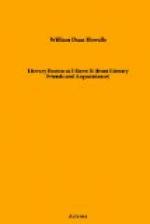Of those more constant contributors to the Atlantic whom I have mentioned, it is of course known that Longfellow and Lowell lived in Cambridge, Emerson at Concord, and Whittier at Amesbury. Colonel Higginson was still and for many years afterwards at Newport; Mrs. Stowe was then at Andover; Miss Prescott of Newburyport had become Mrs. Spofford, and was presently in Boston, where her husband was a member of the General Court; Mrs. Phelps Ward, as Miss Elizabeth Stuart Phelps, dwelt in her father’s house at Andover. The chief of the Bostonians were Mrs. Julia Ward Howe, Doctor Holmes, and Doctor Hale. Yet Boston stood for the whole Massachusetts group, and Massachusetts, in the literary impulse, meant New England. I suppose we must all allow, whether we like to do so or not, that the impulse seems now to have pretty well spent itself. Certainly the city of Boston has distinctly waned in literature, though it has waxed in wealth and population. I do not think there are in Boston to-day even so many talents with a literary coloring in law, science, theology, and journalism as there were formerly; though I have no belief that the Boston talents are fewer or feebler than before. I arrived in Boston, however, when all talents had more or less a literary coloring, and when the greatest talents were literary. These expressed with ripened fulness a civilization conceived in faith and brought forth in good works; but that moment of maturity was the beginning of a decadence which could only show itself much later. New England has ceased to be a nation in itself, and it will perhaps never again have anything like a national literature; but that was something like a national literature; and it will probably be centuries yet before the life of the whole country, the American life as distinguished from the New England life, shall have anything so like a national literature. It will be long before our larger life interprets itself in such imagination as Hawthorne’s, such wisdom as Emerson’s, such poetry as Longfellow’s, such prophecy as Whittier’s, such wit and grace as Holmes’s, such humor and humanity as Lowell’s.
The literature of those great men was, if I may suffer myself the figure, the Socinian graft of a Calvinist stock. Their faith, in its varied shades, was Unitarian, but their art was Puritan. So far as it was imperfect—and great and beautiful as it was, I think it had its imperfections—it was marred by the intense ethicism that pervaded the New England mind for two hundred years, and that still characterizes it. They or their fathers had broken away from orthodoxy in the great schism at the beginning of the century, but, as if their heterodoxy were conscience-stricken, they still helplessly pointed the moral in all they did; some pointed it more directly, some less directly; but they all pointed it. I should be far from blaming them for their ethical intention, though I think they felt their vocation as prophets too much




